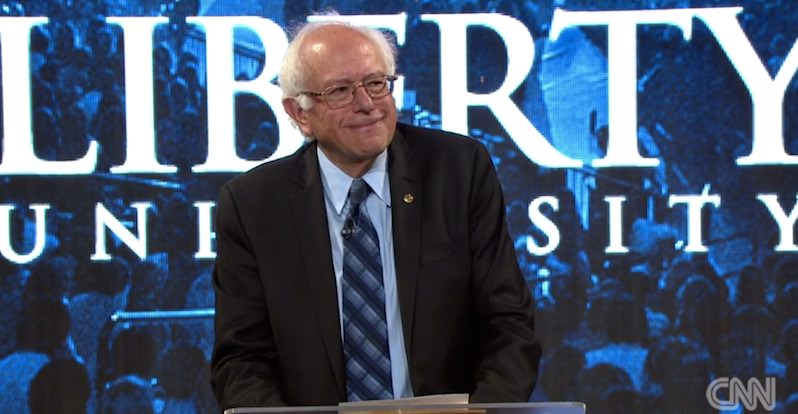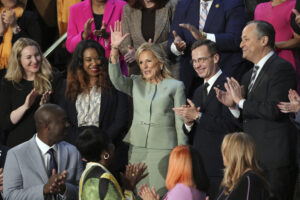When It Comes to World Peace, Don’t Look to Sanders for Progress
His stated policy position is not meaningfully pro-peace, he seeks a more dominant Saudi Arabia in the Mideast and he seems remarkably uncaring to people who don't carry a nice blue U.S. passport. Bernie Sanders during his speech at Liberty University. (CNN screenshot)
Bernie Sanders during his speech at Liberty University. (CNN screenshot)
By Sam HusseiniEditor’s note: A slightly different version of this piece was originally published on Sam Husseini’s blog.
On Monday, presidential candidate Sen. Bernie Sanders spoke to a self-professed conservative Christian group. We live in a time of perpetual war, and Sanders—who sometimes touts his 2002 vote against authorizing the invasion of Iraq—apparently couldn’t bring himself to raise the subject of war with people who profess to be followers of the Prince of Peace.
In his speech at Liberty University, founded by Jerry Falwell, the Democrat said that he and his audience, despite their differences, should both work on economic inequality. (See a video of that speech here and the transcript here.) And it was certainly important for someone to talk to those at Liberty University about the idolatry of money.
NPR’s Tamara Keith accurately reported that Sanders’ reception “was pretty muted except for … one moment. It was after the speech, and the school’s vice president was conducting a short Q and A with Sanders using questions that the students had submitted. And he asked a question about abortion. And in short, the question was, how can Sanders advocate for the economic needs of vulnerable children while not supporting the rights of the unborn.”
Keith continued: “And when the question was read out loud, the students started cheering, and there was this big standing ovation. It was by the far the biggest applause line of the whole event, and that was for the question. Sanders pivoted on the answer to talk about the Republican budget. And given his support for abortion rights, there wasn’t really any way that the students were going to be satisfied with his answer.”
Sanders’ not engaging in a more meaningful way on the abortion question enables the perpetuation of mutually assured stagnation. Liberals who defend abortion rights and others who oppose abortion rights can feel mutually superior to each other while maintaining the status quo.
Sanders received kudos from political observers for speaking to an audience that he disagrees with on many issues. But the fact that the Vermont senator was unwilling or unable or simply insufficiently interested in issues of war and peace to raise them in that setting totally deforms our national dialogue.
No one is more interested in dialogue between left and right than I am. I founded a website—VotePact.org—and a voting strategy on the premise that there’s an anti-establishment center and that a solution to our current predicament would be for disenchanted Democrats and disenchanted Republicans who know and trust each other to have a dialogue and pair up to vote for the third-party or independent candidate(s) of their choice, thus siphoning votes in twos from the establishment parties.
And, as someone who has spent a fair amount of time with self-described Christian conservatives over the course of his life, I think there’s a way—with a lot of work and dialogue—to make a real change.
But that dialogue is constricted and twisted when the stated policy position of the “progressive” in the equation is not meaningfully pro-peace and seeks a more dominant Saudi Arabia in the Mideast.
I’m critical of people who are sufficiently certain in their own worldview that they assert and seek to use the power of the state to coerce women into not having abortions because they know that a fetus should be afforded personhood.
But how can we have a meaningful discussion about the preciousness of life while our country regularly bombs people thousands of miles away? How can we pretend to care about human life when death is an instrument of our foreign policy? This largely comes about because in a deep way, Iraqis and Afghans and Yemenis and Palestinians and many others are simply not afforded the status of personhood by our body politic.
There are, of course, people who espouse a “seamless garment”—who are anti-war, anti-abortion rights and anti-death penalty. They are almost universally ignored.
I honestly don’t know if a fetus is a human being, and I am skeptical of those who claim with all certainty that they do. But I do know the people in Iraq and Syria and Afghanistan and Palestine and other victims of U.S. foreign policy—which sets the standard for violence around the world—are full-fledged human beings.
In Sanders’ worldview, which so far seems remarkably uncaring to people who are not U.S. citizens and is therefore quite xenophobic, these humans are not afforded meaningful consideration because they don’t carry a nice blue U.S. passport.This is in contrast to the newly victorious British Labour Party leader, Jeremy Corbyn, who speaks in quite clear terms against wars—past, current and future. Corbyn has said:
Let us be a force for change in the world, a force for humanity in the world, a force for peace in the world and a force that recognizes we cannot go on like this with grotesque levels of global insecurity, grotesque threats to our environment all around the world, without the rich and powerful governments stepping up to the plate to make sure our world becomes safer and better. And those people don’t end up in poverty, in refugee camps, wasting their lives away when they could be contributing so much to the good of all of us on this planet. We are one world; let that message go out today.
Most Liberty University attendees are not likely to comprehend the humanity of the people in the Mideast because those people proclaim the Islamic faith. Or because the humanity of those people is portrayed as one in need of the faith the attendees of Liberty University profess. But of course, the bulk of Christian conservatives are quite Zionist in their outlook. That is, their presumed affinity for Christian communities in the Mideast, be they in Palestine or Syria or wherever, is insufficient for them to overcome the imperial impulses of “Christian Zionism.” This is in part because they probably haven’t had a meaningful dialogue with enough people from the region.
It was interesting to see the proclamations by the Liberty University master of ceremonies for the event, David Nasser, an Iranian-American and a former Muslim who now is a Christian. He spoke against racism in the Q&A with Sanders, while he acted as and was treated as rather subordinate to Jerry Falwell Jr.—the son of the great founder and who himself is presumed to be a great man.
One would think that in terms of foreign policy, the one thing a liberal like Sanders and those on the Christian right would agree on would be that the Saudi regime, which has fostered Wahhabism, should not be what we rely on to make the region better. But there Sanders was, using his standard talking point about the Saudis stepping up.
The imperial assumptions of liberals and conservatives are therefore silently accepted and reinforced, even as those all around applaud the great dialogue they are having.
By way of a brief correction: At one point in his speech, the transcript from The Washington Post incorrectly quotes Sanders as saying: “And that vision is so beautifully and clearly stated in Matthew 7:12, and it states, ‘So in everything, do to others what you would have them to do to you, for this sums up the war and the prophets.’ That is the golden rule. Do unto others, what you would have them do to you. That is the golden rule, and it is not very complicated.” In fact, Sanders’ quote from Matthew states that “this sums up the law and the prophets.”
Indeed, it is not very complicated. Now, if only Sanders and self-professed Christians would work toward applying this principle to our global policies.
Your support matters…Independent journalism is under threat and overshadowed by heavily funded mainstream media.
You can help level the playing field. Become a member.
Your tax-deductible contribution keeps us digging beneath the headlines to give you thought-provoking, investigative reporting and analysis that unearths what's really happening- without compromise.
Give today to support our courageous, independent journalists.






You need to be a supporter to comment.
There are currently no responses to this article.
Be the first to respond.